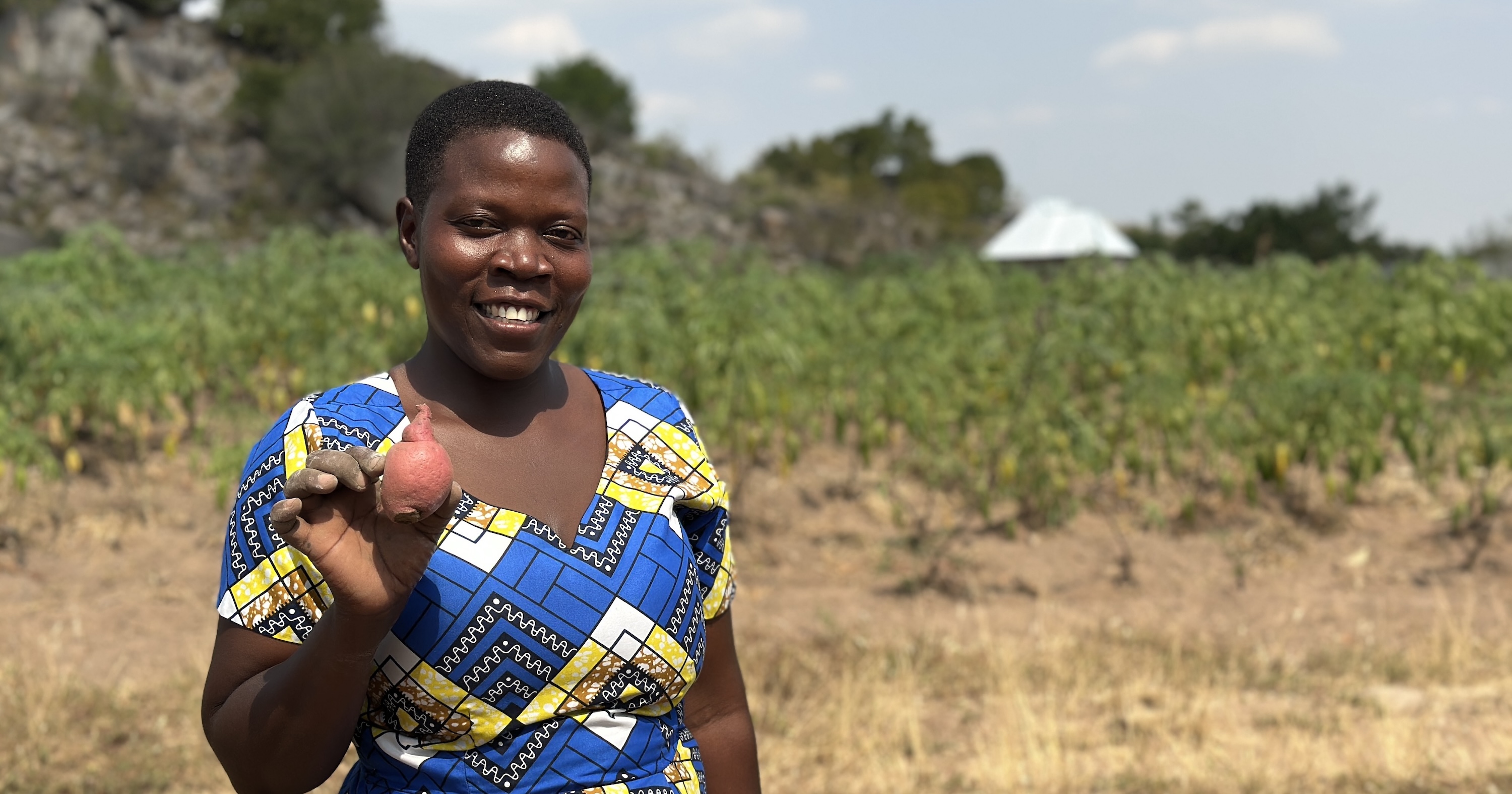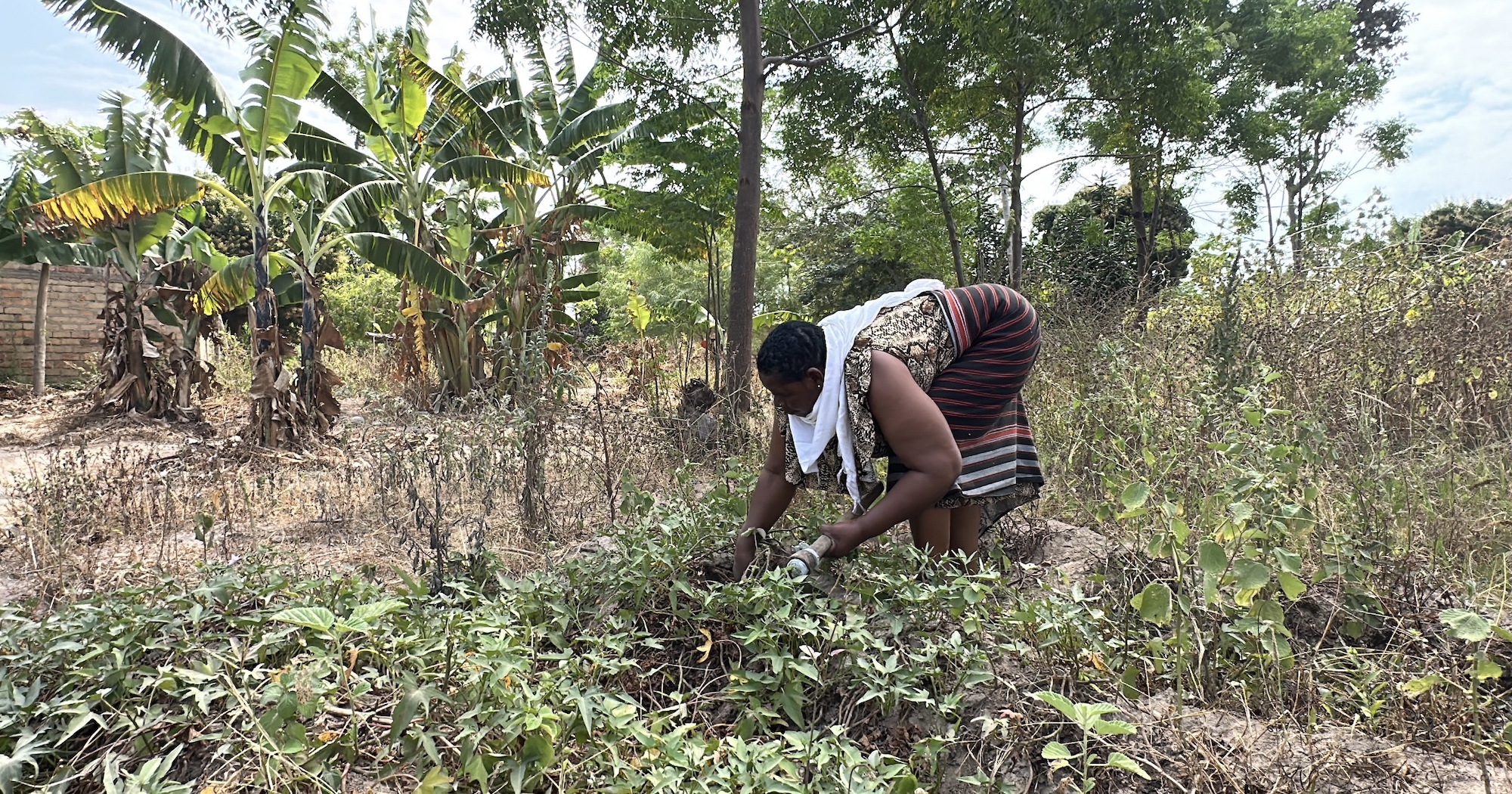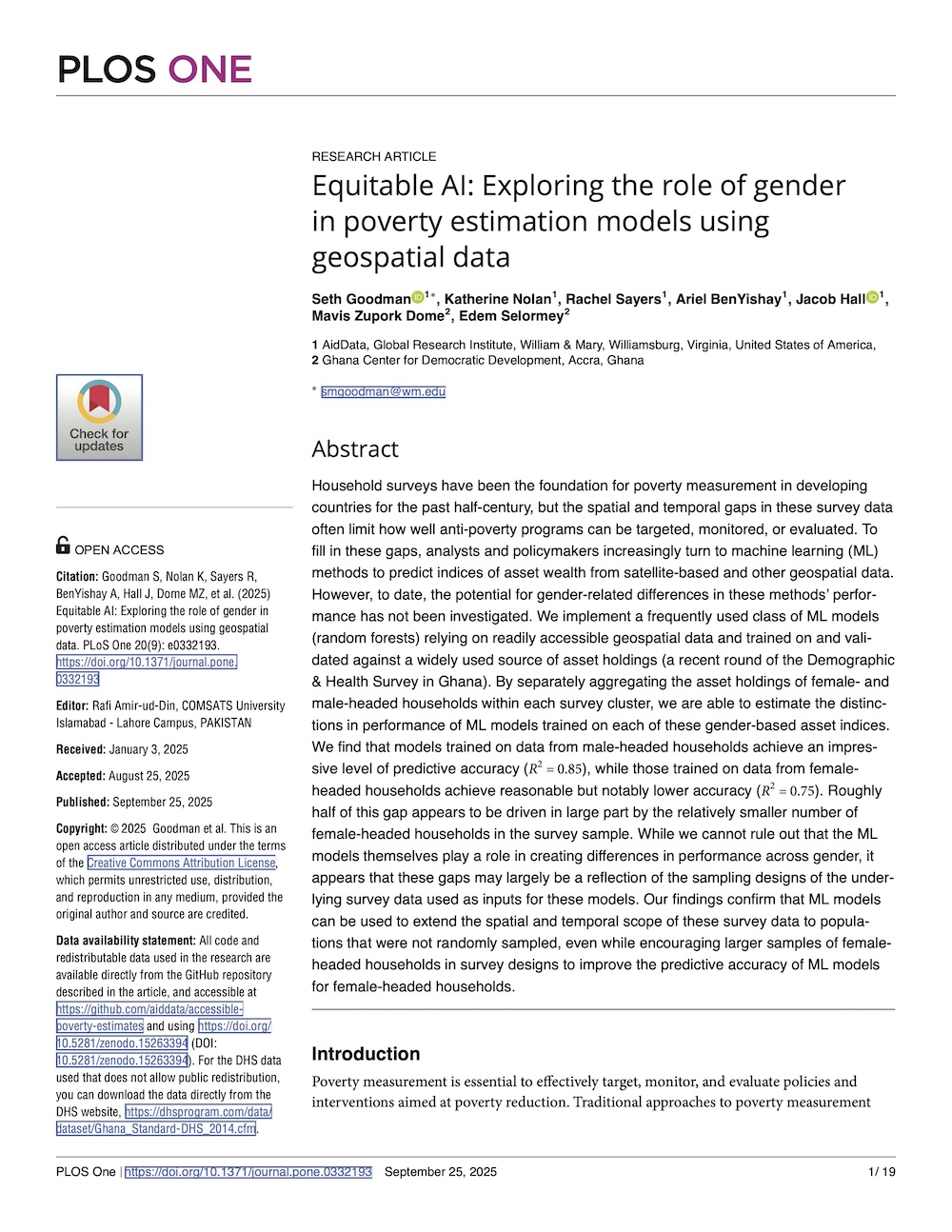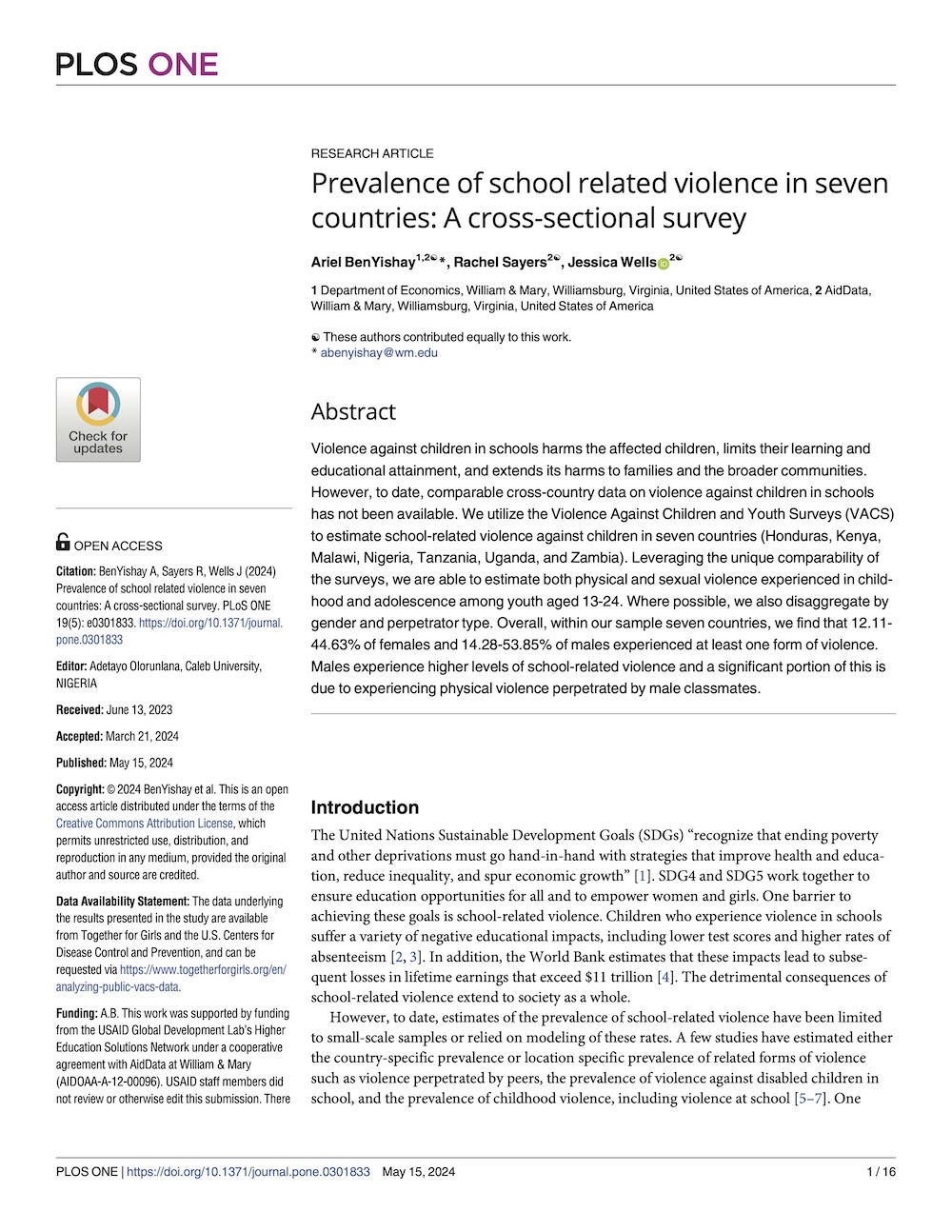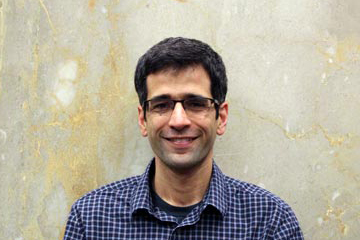Gender Equity in Development
Innovation in research to reduce gender bias in development
Overview
Women face a number of challenges that limit their economic empowerment—including a lack of household decision-making power, insufficient land rights and control of agricultural resources, and high barriers to labor market entry and free mobility. Women’s empowerment is therefore a crucial component of development. Not only does it directly improve women’s autonomy and wellbeing, but it also provides indirect benefits for child health, community engagement, education, and more.
Drawing on our proven track record of expertise in Geospatial Impact Evaluations (GIEs), machine learning, remote sensing, and policy research, AidData's Gender Equity in Development program is conducting innovative research to improve how gender-related outcomes are measured and provide insight into the key barriers facing women's empowerment.
Across the policy landscape, AidData is leveraging mixed-method social science research to assess opportunities for women's empowerment. We've helped advocates conduct landscape analyses of relevant gender-related policies, and we've worked to identify funding opportunities and gaps in current approaches to gender equity. Through our Listening to Leaders survey and Sustainable Development Finance work, we have surfaced findings about how donors prioritize and respond to gender issues.
Africa POWER Consortium
The Africa POWER Consortium brings together five leading organizations—AFIDEP, AidData, EconInsight, IDInsight, and the Human Capital Initiative at Boston University's Global Development Policy Center—to advance women's empowerment through research and policy.
With our partners, AidData is involved in three POWER seed projects focused on leveraging data and evidence to address gender disparities in economic opportunities and mobility:
- We're testing an AI-powered tool that allows policymakers in Malawi to access key data via WhatsApp, improving data-driven decision-making on women's empowerment.
- We're conducting a randomized controlled trial in Ethiopia assesses how low-cost job-seeker support impacts women’s employment outcomes.
- We're studying how improved transport access affects women’s mobility and job opportunities in Ethiopia.

Measurement and Key Issues
Measurement

Improved accuracy
Gender-related outcomes are often difficult to measure accurately and precisely with traditional survey techniques, which prevents understanding the full impact of policies to boost women’s empowerment. AidData seeks to improve the measurement of gender-related outcomes by characterizing measurement error through a combination of on-the-ground survey techniques, remote sensing, and behavioral games. By understanding how measurement error in surveys relates to gender, we can provide recommendations for policymakers and practitioners to reduce it moving forward.

Improved efficiency
Measuring women’s empowerment with traditional survey techniques can fail in contexts where it is costly to implement or it is unsafe or difficult for women to participate freely in surveys. AidData seeks to investigate where and when satellite imagery, remote sensing, and machine learning can supplement on-the-ground measurement of women’s empowerment. Our goal is to understand which gender-related outcomes can be measured entirely or partially through remote sensing and machine learning and under what conditions.
Key Issues

Empowerment and hidden bias
Bargaining within households impacts a woman’s control over resources, her personal independence, and her risk of experiencing intimate partner violence. Development programs often lack baseline and follow-up data to evaluate their impact on women's bargaining power. Unfortunately, even when data does exist, it may reflect a hidden gender bias, due to intra-household dynamics.
AidData and its local partners seek to combine on-the-ground survey techniques, remote sensing, and behavioral games to understand the extent of measurement error in self-reporting, and how development projects may impact household bargaining and intimate partner violence.

Farming and land rights
Women’s land rights are often curtailed by local laws and customs that limit the ability to own property, own land titles, and choose the types of crops to grow. What's more, women lack equitable access to arable land, formal training, and agricultural inputs.
By combining household surveys and high-resolution satellite imagery, we can better understand how property rights, relationships, levels of empowerment, and access to agricultural inputs might impact a range of outcomes from crop yields to household bargaining power, providing insights for programs and policy makers.

Employment, mobility, and security
When commuting to work, women endure greater threats to their health and safety and spend more time and money than men do. Helping women overcome barriers to employment not only increases resources within their households, but may also increase their bargaining power and reduce intimate partner violence.
By improving data on the ground and leveraging remote-sensed data, our research team seeks specific insights that help programs focus their resources on improving a wide range of outcomes—whether the goal is helping women gain access to marketable skills or improving public safety so that they can return home safely.
Case Studies
How can we better evaluate gender bias in AI applications using survey data?
We're working to increase transparency and accountability in AI for global development
In partnership with Ghana Center for Democratic Development (CDD-Ghana), AidData has worked to evaluate the potential for gender bias in wealth estimates generated using artificial intelligence (AI). We're leveraging AidData’s expertise in artificial intelligence, geospatial data, and household surveys plus CDD-Ghana’s knowledge of the local context and environments to produce a novel public good to inform discussions on the growing use of AI in development.
Funded through USAID’s Equitable AI Challenge and implemented through DAI’s Digital Frontiers agreement with USAID, our project approaches a critical problem: increase the accountability and transparency of AI systems used in global development contexts.
How does gender affect the uptake of superfoods like sweetpotato?
We're researching how new agricultural techniques spread—and how reducing gender bias can improve farming
Women reportedly make up around half of global agricultural labor. Yet across much of rural Sub-Saharan Africa, women farmers remain on the margins of agricultural innovation.
AidData researchers are testing how remote sensing, machine learning, and social network analysis can both measure and increase the cultivation of a crop with vital and proven health benefits, orange-fleshed sweetpotatoes—and how gender affects its uptake.
With organizational partners across the globe, we're conducting three evaluations across Africa:
- A retrospective geospatial impact evaluation (GIE) on the sustainability of an emergency sweetpotato program in Ethiopia.
- A survey-based analysis of the impact of gendered social networks on the spread of information on sweetpotato in farming communities in Ghana.
- A remote sensing-powered analysis to measure the spread of sweetpotato in communities in Tanzania.
Did dam-building projects deliver different benefits based on gender?
We're piloting a methodology to better disaggregate geospatial data by gender and correct for measurement error
Droughts from changing rainfall patterns are making farming untenable in Ghana's northern regions, where less than 2% of farmed land has irrigation infrastructure, leading to mass internal migration. To combat this, Ghana’s government launched a national program to build a small-earth dam in every northern village. But did the program achieve its goals? And how did the impacts vary based on gender?
To answer this, AidData’s partnered with CDD-Ghana to evaluate how outcomes of the dam program differed between men and women, especially related to household dynamics. Impact evaluations rely on models that assume measurement error in data is random—but if this error is systematically skewed by gender, the entire evaluation can be biased.
With funding from the Hewlett Foundation and Innovations for Poverty Action, we worked to identify the measurement error in self-reported agricultural characteristics by collecting high-quality, gender-disaggregated data. This pilot project and its innovative evaluation methodology is now being scaled with other regional partners in sub-Saharan Africa.
School-Related Gender Based Violence (SRGBV)
With support from the Government of Canada and USAID's Higher Education Solutions Network (HESN), and in partnership with Together for Girls and the U.S. Centers for Disease Control and Prevention, AidData conducted a secondary analysis of the Violence Against Children Surveys (VACS) data to identify the prevalence of SRGBV, as well as details on violence perpetration, victimization risk and post-violence behaviors in selected countries.
Our methodology can be used to understand the prevalence of physical and sexual SRGBV across all countries for which the VACS was conducted and has been used to inform policymakers, practitioners, and researchers for better violence prevention.
Featured Reports
For partnership and media inquiries, contact:

Alex Wooley
Director of Partnerships and Communications

